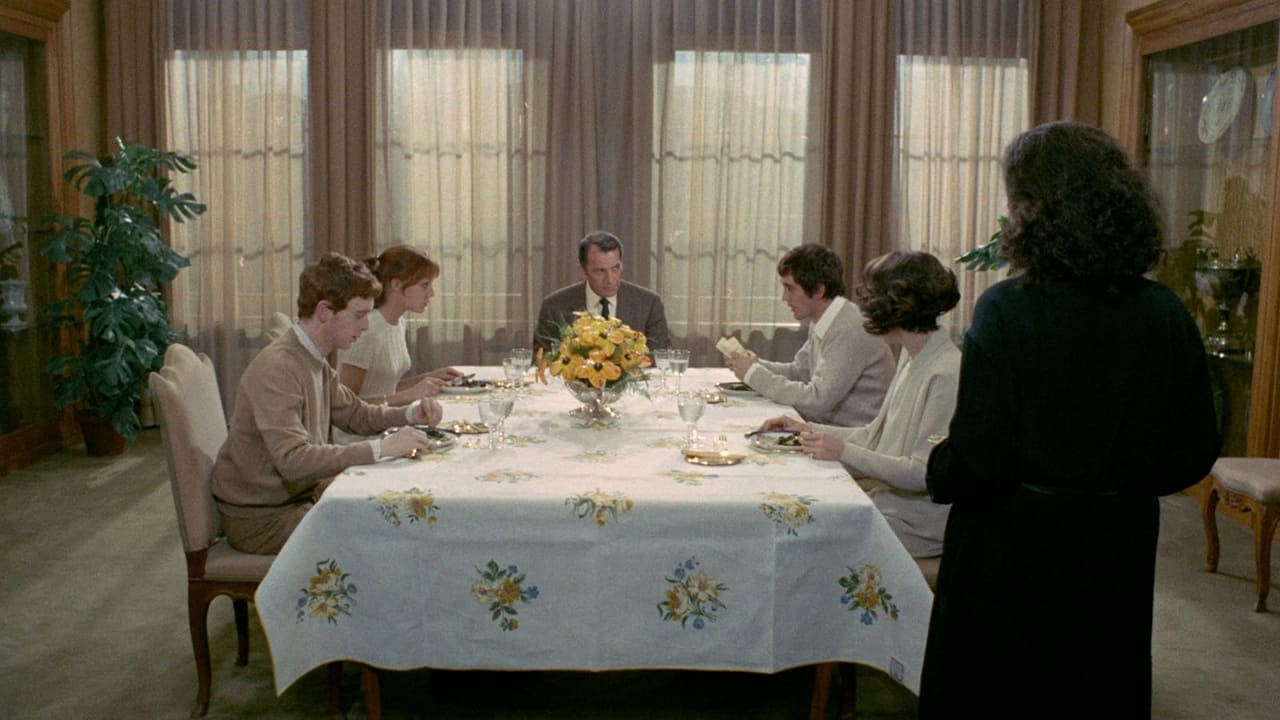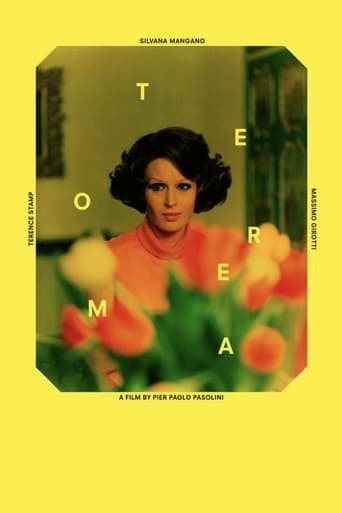Gurlyndrobb
While it doesn't offer any answers, it both thrills and makes you think.
Billie Morin
This movie feels like it was made purely to piss off people who want good shows
Casey Duggan
It’s sentimental, ridiculously long and only occasionally funny
Martin Bradley
At the beginning of "Teorema", in a wordless, sepia-tinged montage, we are introduced to almost all the main characters in Pasolini's film. It's a clever device, almost Hitchcockian, and it could be the beginning of a thriller, though being a Pasolini film we know this won't be a thriller. The character who doesn't appear in this montage is played by Terence Stamp but suddenly there he is right in the middle of things and his affect on everyone is profound. Who is he and why is he here? It's never made clear, of course. Although a very physical presence his role is allegorical. Is he an angel, (there is a strong religious element in the picture), or a devil or simply a seducer since he does seem to have sex with everyone in the family, male and female, including the maid who ends up levitating and performing miracles. He certainly affords everyone a form of release, turning their lives upside down and with it their bourgeoisie pretensions. If we are going to tear down the bourgeoisie we may as well do it with sex; it's a lot more fun than beating them to death.Stamp, of course, remains the most beautiful thing on screen though Silvana Mangano as the mother gives him a run for his money. No-one really has to act; all they simply have to do is respond to Pasolini's camera and, with no real narrative structure, that's fairly easy. Sex may be Pasolin's weapon of choice but the film is quite clearly a Marxist 'fantasy' and is also very obviously the work of a gay director. I'm not so sure anymore if it's the masterpiece I thought it was all those years ago bu it stands up remarkably well and remains one of the great Italian films of its decade.
Jugu Abraham
Ranks alongside his "Gospel According to St Mathew." I saw several metaphorical links in "Theorem" to Fellini's "Nights of Cabiria," a film scripted by Pasolini; the contribution of Pasolini to the lovely Fellini film is often overlooked.The allusion to the Terrence Stamp character as Christ is not difficult to pick up. The political context is also more than obvious. "Theorem" encapsulates all of Pasolini's genius evident elsewhere, in one work.Here's a Pier Paolo Pasolini film that's different--he uses good looking established actors unlike his other works where he would pick actors unknown and less attractive. In "Theorem" the good looking characters are contrasted with the ugly, non-professional actors intentionally.The film might appear overtly to be about sex but Pasolini's canvas captures a lot more than the obvious. Brilliant casting. Mozart's "Requiem" rendered by the Russian Academy Choir is transcendental. Morricone's use of wind instruments is so different here but captures the mood of loneliness. Terrence Stamp is the eye candy of the film, just as he was in "Far from the Madding Crowd". All three ladies: Sylvano Mangano, Laura Betti and former Mrs Jean Luc Godard (Ann Wiazemsky) give more than interesting performances--each body movement tells you so much. Words are rarely required to communicate in "Theorem"; visuals and music do more in that department.
lreynaert
A lot of ink has already flown over the apparently enigmatic movie 'Teorema' shot by Pier Paolo Pasolini. Hereafter my own interpretation in the light of his whole work.Pier Paolo Pasolini's curse As he explained in his book 'Amado Mio – Atti Impuri', P.P. Pasolini's lifelong curse was the sexual attraction of ephebes. This curse was a Christian one. Homosexual relations between an older man and an adolescent were considered to be totally natural in ancient times (Sparta, Marcus Aurelius, Theocritus) before Christianity became the dominant, totalitarian religion, with its morality holding on that procreation was the only goal of sexual intercourse. The Christian Churches considered also that the family nucleus was the best means to propagate its own religious faith from the parents to the children.This curse was also a bourgeois one. Promiscuity was rampant among the majority of the population (the lower classes which possessed nothing) and the nobility (except for the legal spouses, because within the ruling classes the fatherhood had to be assured). The bourgeois class crept out of the mud of the lower classes and adopted the family policy of the Christian Churches. The wealth gathered by lifelong hard toiling had to be preserved within the family. For those whose sexual (promiscuous) drive was too strong, there were the brothels exploited by the Churches (E.J. Burford).Pasolini's gospel: free sexuality 'Teorema' is a plea for free sexuality, personified in the main character of the movie played by Terence Stamp. He has sexual intercourse with everybody: young and old, male and female, the lower and the middle classes. This free sexuality shatters the family nucleus and shakes fundamentally the behavior of its members. It fully undermines the Christian bourgeois morality, which stands in the way of people wanting to live fully their own sexuality. But, before it can be implemented, a community has to go through the desert. P. P. Pasolini didn't foresee that between the 1960s and now, the Christian and the bourgeois mentality and morality would nearly totally disappear. People now can change partners as easy as they can change their shirts. Only children are legally protected. In 'Comizi d'amore' (1964) Pier Paolo Pasolini was openly insulted to be a disgusting individual (by people who didn't know his sexual preference).And what about Pasolini's communism? In the beginning of the movie, an entrepreneur gives his plant freely away to his workforce. But, one of the workers says that this is not enough: one should also get rid of bourgeois morals. One should not forget that after the Bolshevik revolution in the USSR 'free love associations' became a norm (not for long) under the advocacy of Alexandra Kollontai.Although sexual morals have substantially changed since the shooting of this movie, its bold treatment of human sexuality is still unsettling. Not to be missed.
Bene Cumb
For me, Italian and Swedish artistic films have a lot in common, beginning with static scripts and ending with poker-faced performers. Usually are Pasolini's films different from this pattern, but not with Teorema where the above mentioned features are fully visible. Of course, directing and camera work are great and the actors-actresses are at least good, if not more, but I am not very much into profundity connected with religion and sexuality. And boredom among the rich, long dialogs with literary connections, background classical or church music - all this has been used before and after Pasolini. And those endless scenes without any text… Well, the ending was also not according to my taste.Luckily, the film is only 1,5 hours, but I could recommend it only for selective , like-minded audience.

